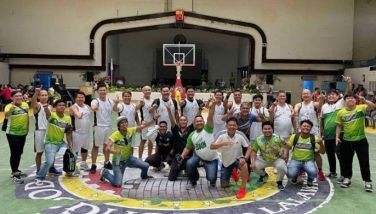Harmony in Duality
What do you get if you put two masters in the same room?
Apparently, you get dual exposure.
The Bluewater Gallery at Maribago Bluewater Beach Resort (www.maribago.com.ph), recently unveiled dualXposure, a back-to-back exhibit on the works of painter Boy Kiamko (www.boykiamko.multiply.com) and sculptor Jet Florendo (Mobile: 0910-952-1508).
Kiamko said that the pieces displayed are continuations of their works as artists.
“(Our works) are a product of our daily existence. These are reflections of our thoughts at the moment, the principles that run through our veins,” he said, adding that as man ages, the more he needs to have a principle in his life.
The diversity of the subject is apparent in the different works displayed because as Kiamko explains, they refused to confine themselves to a particular theme. Despite this, harmony can be perceived in the displays, every piece of sculpture complementing every piece of painting.
Florendo’s smooth, curvilinear, achromatic and earthy pieces efficiently blended with Kiamko’s sharp colors, geometric figures with sharp angles, and premeditated dots and lines. Amazingly, each piece completes the other, which would make one believe that a Florendo is meant to go with a Kiamko.
One of Kiamko’s newer works on display is the 110 x 53 inches Bread and Wine, done in acrylic on canvass. Kiamko said that this is a manifestation of the mosaic he did for St. Bonifaz Church in Munich, Germany in the 90s. The piece was called, This is My Blood, This is My Body, and was displayed to add accent to the church’s altar.
Kiamko said that the subjects he chooses are universal, reflecting his philosophy that art should be universal and should be appreciated by all, regardless of ethnicity, color, creed and philosophy. This is why one of his most preferred subject is the Mother and Child.
“The best composition is the Mother and Child because here there is already harmony, there is love, care and protection,” he said. And in this collection, Kiamko displayed a number of his different depictions of this universal love.
One such work is Pieta, done in all shades of red, capturing the love of a sorrowful mother towards her dying child. A noticeable personality of the artist’s depiction of man is its absence of features, which is very evident in this painting.
Kiamko explains that this is to erase the racial attributes of his subject, because as he admitted, not all collectors, foreign or local, would appreciate a painting of a person that represents a particular racial profile.
Even his other subjects, like the guitar, the fish, the horse or the dragon, has, in a way, universal appeal, recognized and appreciated by all cultures of the world.
“Take the guitars,” he said. “This is the best instrument that represents both rich and poor. Although this may represent Cebu, but the guitar is universal because it is a form that can be identified all over the world.”
Florendo, on the other hand, revealed that his works reflect inner turmoil shaped to create order. He said that as long as there is some kind of order, an artist could always create, even from chaos.
This is best reflected in his work Erratic Harmony, which depicts a creation with strong clear grounding, providing stability amidst the chaos that hounds him on the surface.
Florendo has indeed befriended his medium, as one could see the clean and smooth transition of his works as it bends and tries to enter even the tiniest nooks and crannies within the work. The natural color and grain of the wood is accentuated by the way Florendo treated his subjects, lending a sense of harmonic foreboding to his works.
Introspection, for example, would have the observer looking at the head of a man burdened by thoughts of, perhaps, the past, present and the future.
Florendo, however, does not only create chaos. He has also created very simple yet inspiring Mother and Child pieces, which, according to him, is his way of resting after doing some complicated pieces.
“The Mother and Child pieces have been simplified. Gi-reduce sa pinaka-simple element sa figura (Reduced to the simplest element of the human figure),” he said.
For this collection, Florendo used mahogany, gemilina and molave.
Florendo and Kiamko have known each other as artists for more than three decades already. Dual Exposure is their first joint exhibit. Kiamko, however, is positive that since their works beautifully blend with each other, several joint exhibits may be in order.
Florendo recently celebrated his 35th year as a sculptor, and has, in his credentials, more than 2,000 works with around 35 exhibits to his credit. Kiamko, on the other hand, started as a landscape painter in the 70s. In his more than three decades in the art scene, Kiamko has put up, to his credit, “22 one-man shows, half a dozen international exposures and sold a thousand artworks in circulation in four continents.”
dualXposure will be on display at the Bluewater Gallery (Tel. 492-0100 loc. 512, Ruben) until November 13.
- Latest
- Trending


















